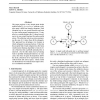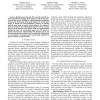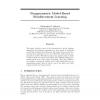81 search results - page 6 / 17 » The Optimal Reward Baseline for Gradient-Based Reinforcement... |
ICML
2003
IEEE
14 years 8 months ago
2003
IEEE
The paper explores a very simple agent design method called Q-decomposition, wherein a complex agent is built from simpler subagents. Each subagent has its own reward function and...
ICML
2010
IEEE
13 years 8 months ago
2010
IEEE
Abstract--Reinforcement learning (RL) research typically develops algorithms for helping an RL agent best achieve its goals-however they came to be defined--while ignoring the rela...
NIPS
1997
13 years 9 months ago
1997
This paper describes some of the interactions of model learning algorithms and planning algorithms we have found in exploring model-based reinforcement learning. The paper focuses...
CORR
2012
Springer
12 years 3 months ago
2012
Springer
Reinforcement learning addresses the dilemma between exploration to find profitable actions and exploitation to act according to the best observations already made. Bandit proble...
IWANN
1999
Springer
13 years 12 months ago
1999
Springer
To avoid the curse of dimensionality, function approximators are used in reinforcement learning to learn value functions for individual states. In order to make better use of comp...



